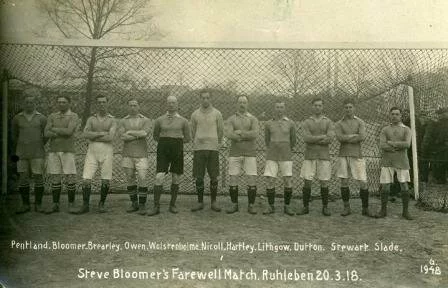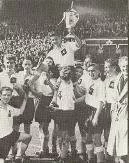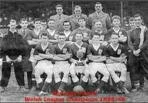
The Great International Match
A remarkable recent find of a football programme in the National Archives has unearthed more information about a match played over 90 years ago in a German Prisoner of War camp when England, captained by the legendary Steve Bloomer, took on an International XL skippered by Scottish international John Cameron.
Billed as the ‘Great international Match’ the game was played at Ruhleben POW Camp on Sunday, May 2, 1915 with kick-off scheduled for 4:30pm.
Although it had previously been well documented that this game had taken place the discovery of the programme, or rather team-sheet, at the Foreign Office in November 2005, reveals for the first time the names of all the players involved in the contest.
Although the match was played between prisoners in a POW camp it should be explained that Ruhleben differed from other camps in that it housed very few military prisonners.
Most of the 5000 occupants had being interned at the start of the war because they were Britons either working or on holiday in Germany at the time or were Germans with British family or connections.
Steve Bloomer, who captained the England team, was a typical Ruhleben occupant in that he spent four years at the camp after being interned in November 1914.
He had travelled to Germany three weeks earlier to coach Berlin Britannia – probably not the greatest career move by the man who was hailed as footballs first ever superstar and who had cracked 28 goals in just 23 pre-war appearances for his country.
Apart from Bloomer the England line-up also included professionals Fred Portland, Samuel Wolstenhome and John Brearley with amateurs making up the rest of the team.
The Rest of the World side may have been captained by Scot John Cameron but most of his team appear to be English with one or two other Scots and a Welshman making up the numbers.
Sadly, despite the programme being found, there is no record of the result though a small silver cup later found amongst the possessions of one of the Rest of the Wold players may provide a clue as to which team won. The fascinating aspect of the ‘Great International Match’ is the environment in which it was played.
Ruhleben was a racecourse outside Berlin which was converted into a prisoner of War camp in 1914. Conditions to begin with were primitive and Bloomer was later to recall that each prisoner was given a straw filled sack and a horse blanket so they could bed down in the stables and that “a piece of repugnant blood sausage and watery ‘skilly’ were all we ate in those dark early days.”
What made the story of Ruhleben remarkable was that the prisoners convinced the Germans to let them rule themselves. In time the camp became a mini British town with businesses, its own postal service, a full sports programme and even a casino!
Football was a great escape for the prisoners with leagues formed with barracks taking the name of English Division One teams and regular representative fixtures.
The camp had its own printing press and a magazine regularly carried reports of football matches attracting crowds of over 1000 spectators with the Great International match said have drawn a crowd approaching 3000. |
|
|
Copyright NonLeague Football History 2008

 Delicious
Delicious  Digg
Digg  Facebook
Facebook  Google Bookmarks
Google Bookmarks  Furl
Furl  Stumbleupon
Stumbleupon  Yahoo My Web
Yahoo My Web



